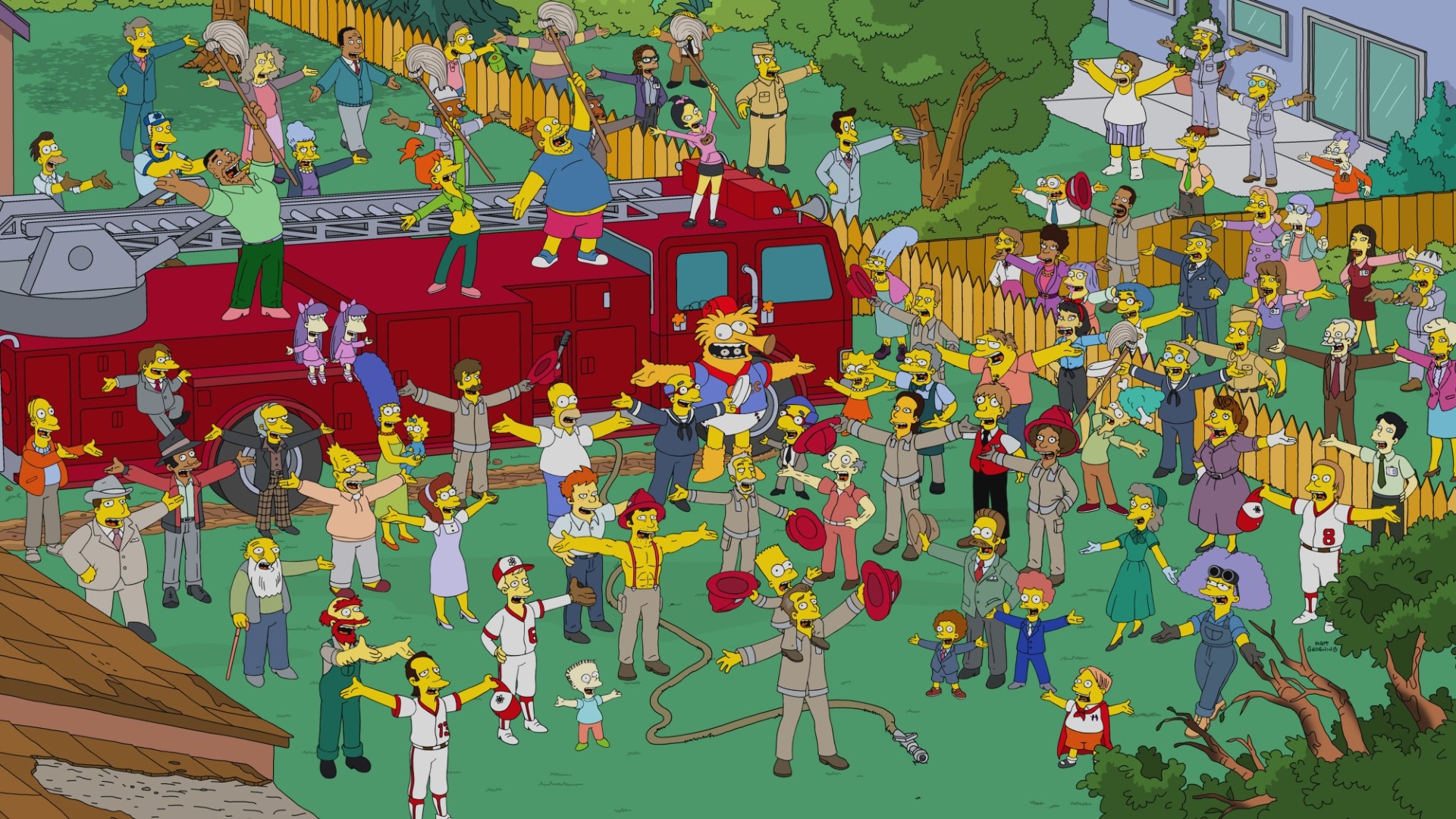This The Simpsons review contains spoilers.
The Simpsons Season 33 Episode 22
Even with the ever-delightful Hugh Jackman at his most Broadway melodic as a magical singing janitor, “Poorhouse Rock” is the most punk episode The Simpsons has offered in a long time. It’s like having Johnny Rotten narratively croon a “Schoolhouse Rock” with the ultimate lesson: There’s no future for you.
Of course, The Simpsons would never make such a blatant musical choice for its most anarchic episode. The song suite which centers the episode is catchy, dammit, because the creators want it to get stuck in the audience’s head. Although, Robert Reich is probably not the most obvious choice for an earworm. The Simpsons, which began as an equal opportunity offender of political sensitivities, has firmly committed itself to progressive parody. They lay it out straight, targeting a large portion of their own audience, and the studio which keeps them gainfully employed.
The song begins when everyone comes back from the second World War to the factory floor. Yes, it was racist, but grit and grind created an American middle class, now sucked dry by the greedy wealthy class, like Mr. Burns and Scrooge McDuck. They are the Bezos, the rest of us are the Bozos, except possibly Krusty the Clown, who finally got that tax break he was angling for. The song calls out the climate deniers and lunatics from QAnon so incredibly easy to scare they vote to shred the safety nets.
The hymnals are actually much funnier lyrically than the economic lesson suite. The call for the “praise, praise, praise” of God, goes on to include his hair and shape. Has God been working out? For sheer humor, they beat the theme of: All dreams die. The middle class is the last man standing.
This is exactly the kind of episode Fox News viewers and Tucker Carlson (the “Putin for President” line may not even be satire.) zombies complain about, so when The Simpsons specifically name them as the problem, it is a defiant preemptive strike. Reich already mentioned the decline of unions, so good luck with collective bargaining. The only payouts go to the firemen and the choir being sung to. This is obviously by design, and it is a good thing there is a high laughter quotient, because nasty medicine is being pushed down some hoarse throats with an off-brand sugar substitute.
The premise of the episode is perennial. Homer tries to earn Bart’s respect, succeeds, or fails or both. Who’s keeping score? This also isn’t the first time Bart has been in Homer’s office. The overall plot is well-done, with enough twists and suspense built in, and a rapping Lisa. The first segment moves very quickly between subjects to get to the central story. The second half is exceptional. The opening couch gag foreshadows the episode by flashing forward to a slacker future, even for Maggie. This ties in to Bart’s later suggestions for success in the gig economy.
The episode opens with Marge preparing a snack for her friends while they binge “Tunnelton,” a very classy English show. We learn biscuits are really just the British word for cookies, but the real takeaway is these aristocratic British historical dramas are just soft porn for Victorian fetishists. Sarah Wiggum is again voiced by Megan Mullally, who may be putting a little too much of herself into the role. The binge club ultimately drinks, gossip, and ogles. A later bit about women whistling as firemen walk pass is also a subtle nod to the Bridgerton (or Downton Abbey) crowd. The fantasy is the future. Fire isn’t going anywhere.
One of the lessons we get from the episode is that everyone’s going to be a firefighter someday because the whole world is on fire. This is a constant concern on The Simpsons, although “Poorhouse Rock” also uncovers other harsh truths, like how modern superheroes can fly but can’t process their own trauma. Homer’s realization that the Simpsons can’t be a two-hangover household is both self-revelatory, and an indictment on society as a whole. How come only part-time drinkers get to sleep it off, when committed drunks are forced to pay penance?
Homer’s act of proxy contrition, getting out of bed and taking the kids to church, leads to the central theme. Bart, singled out because he sniffs Jesus’s feet on a crucifix, is assumed to have skipped his homework. “For a woman of faith, you have none in me,” Bart says, before he shows a supercut of Homer’s fails to a room of Sunday school classmates, because kids just use cameras for shaming now. Homer is humiliated, and tries to win Bart’s esteem by taking him to work, and showering him with singles.
The sad thing is Homer really is the future. You need a slide rule just to figure out if he’s still actually working at the Springfield Nuclear Plant. He’s been fired, re-hired, and been given three-day weekends that have gone on forever. Homer is our future: the gig economy Bart will face when his bitcoin wallet is dried and no one watches him shake his cans on OnlyFans.
Bart’s final act is an escalation which may have more repercussions than first meet the eye. “Poorhouse Rock” signals an end of an era. The Simpsons have reclaimed their anti-establishment roots. The treehouse is a metaphor. While it probably won’t interrupt the annual “Treehouse of Horror” episodes, it is traumatically far more frightening. The season finale finishes a dance which started when Matt Selman began calling the tunes. Season 33 opened with a musical, “The Star of the Backstage,” and ends with a mic drop.
